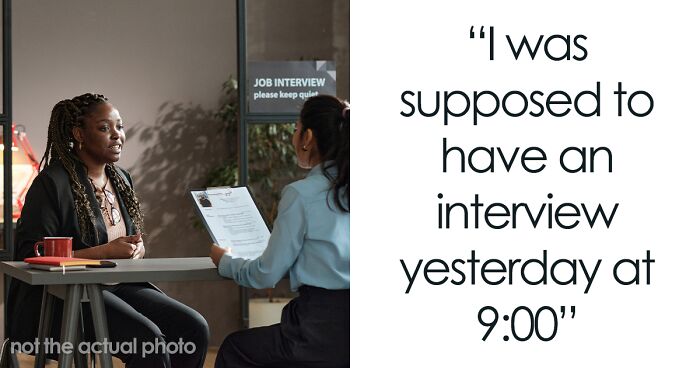
“Do I Have ‘STUPID’ Written On My Forehead?”: Woman Walks Out Of Interview After Being Tricked
Job searching is a painful endeavor that most people would like to avoid. With candidate selection processes getting more and more complicated, finding a job has become a job on its own. Excessive applications, personality quizzes, multiple interviews, trial tasks, and trial days are all amongst the most common hoops people need to jump over just to get employed. In between all these, it’s easy to forget that you are also supposed to evaluate your possible employer and interview them to see if they are a good fit for what you are searching for.
The Redditor below that goes by Ophelia1988 shows how this is supposed to be done. You come into the room knowing your worth and you communicate it to everyone there.
When you go in for an interview, it’s important to remember your worth. You cannot sell yourself short and you have to stand up for yourself when needed
Image credits: AnnaStills (not the actual photo)
This woman went in for an interview hoping for the best. However, the interviewer threw her a curveball. She was prepared, though, she didn’t flinch
Image credits: DragonImages (not the actual photo)
Image source: Ophelia1988
The woman was appalled by the fact that she was expected to do a trial day for free
Image credits: Karolina Grabowska (not the actual photo)
The woman (OP) came in for the interview in the morning, expecting to have a chat about the possible job position. Afterwards, if everything went well, she was supposed to do a half-day trial, getting to know the day-to-day tasks she would be facing. However, when she sat down for to discuss the position, the interviewer informed her that the plan has changed. Apparently, some of the staff got sick and the interviewer was now required to supervise apprentices. She suggested the woman does the trial day first and they can talk it all over after.
This, of course, didn’t fit the interviewee’s expectations. As a professional that has been in the field for 10 years, she knew that doing 5 hours of unpaid work for a position she was not even sure she wanted was crazy and borderline illegal. She did not know what the salary was, what benefits she would get, and what colleagues she would have, so why would she work for free? So, she insisted that she needed to know more about the job before committing to a trial day. The interviewer, however, didn’t let up, saying that this was a necessary change and nothing can be done about it. The woman then informed her that they needed to reschedule and left.
“Do I have ‘STUPID’ written on my forehead?” the OP vented her exasperation when complaining to the internet. However, she is not opposed to trial days per se. She later divulged that she got the job she’s recently quit without a trial day and she hated the atmosphere there. So, she appreciates getting to know the company for the inside before committing to a job. She just felt it’s unfair to ask her to do so before she even knew if the job fit her standards.
Free trial shifts are often an illegal practice that should be reported
Image credits: Andrea Piacquadio (not the actual photo)
Are free trial shifts even legal, though? Well, that depends on the country you live in and the trial you’re being asked to do. For example, in Australia and the UK short trial shifts can be used as long as it’s a legitimate part of a recruitment process. These trials shouldn’t take more than a couple hours and should be held only to prove that you have competence in a job you’re being hired at.
Let’s say you’re being hired as a mechanic at an auto repair shop. The senior mechanic can ask you to show that you know your way around a car, know how to do the job safely, and are familiar with the tools and practices of the trade. The trial then ends soon after you show that you are qualified for the job. However, if you are being asked to work for multiple hours or worse, a few days, just so they can “get to know you” or “see if you fit in”, that’s a big red flag and you should run.
Of course, it’s understandable when hiring managers want to know if their possible employees can not only talk the talk but also walk the walk. In those cases, the best way to go about it is to set up a paid trial. This could be a day or a week depending on the job at hand. During the trial you can test the important skills the job and see how the candidate can handle making a mistake.
All in all, always check with your local authorities about what’s legal and not. If something smells fishy, be sure to investigate further. And as always remember your worth, stand up for yourself, and make sure to keep all the receipts.
The woman clarified a few points that Redditors had questions about
Most Redditors congratulated her on her firm stance
Others shared her unfortunate trial day experiences
The commenter talking about the liability is 100% right. If there's a problem, some tool breaking, op falling and knocking their head or any other sh*t that can happen in a workplace : 0 insurance, op is the sole responsible. Depending on the sh*t, they could literally sell their house for that.
I also think that a trial day is great for both parties to get an idea of how good the relationship may be but if the cold facts of working conditions and pay are not told before (which can solely be a reason to not want this job) it's bonkers to me
Yes, I actually wouldn't mind doing them because it helps gage the work environment and the people I'd be working with (only when they're paid though - which is by law). I have noticed that the jobs that had trial days though were consistently red flags - it was always blatantly obvious they were toxic work environments when I'd do them.
Load More Replies...The commenter talking about the liability is 100% right. If there's a problem, some tool breaking, op falling and knocking their head or any other sh*t that can happen in a workplace : 0 insurance, op is the sole responsible. Depending on the sh*t, they could literally sell their house for that.
I also think that a trial day is great for both parties to get an idea of how good the relationship may be but if the cold facts of working conditions and pay are not told before (which can solely be a reason to not want this job) it's bonkers to me
Yes, I actually wouldn't mind doing them because it helps gage the work environment and the people I'd be working with (only when they're paid though - which is by law). I have noticed that the jobs that had trial days though were consistently red flags - it was always blatantly obvious they were toxic work environments when I'd do them.
Load More Replies...
 Dark Mode
Dark Mode 

 No fees, cancel anytime
No fees, cancel anytime 






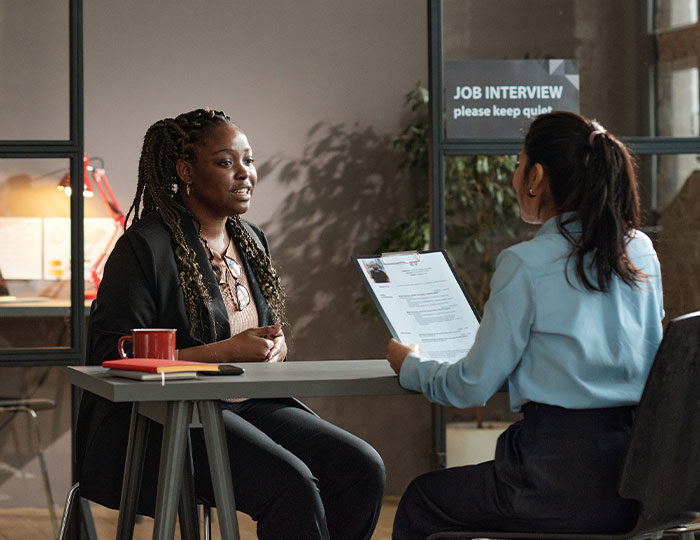
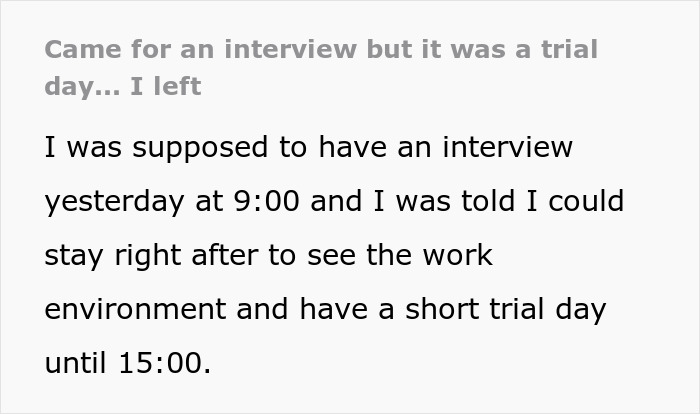
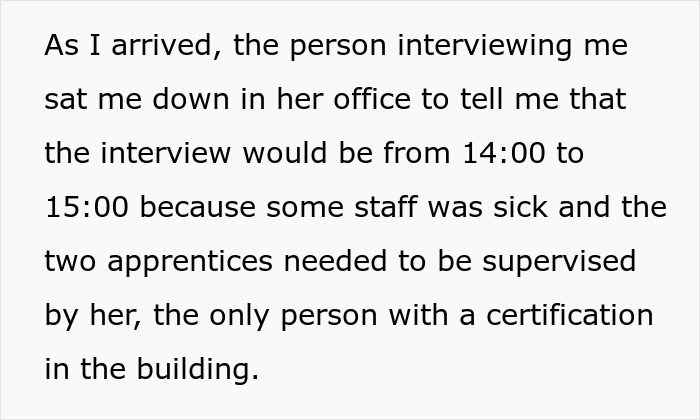
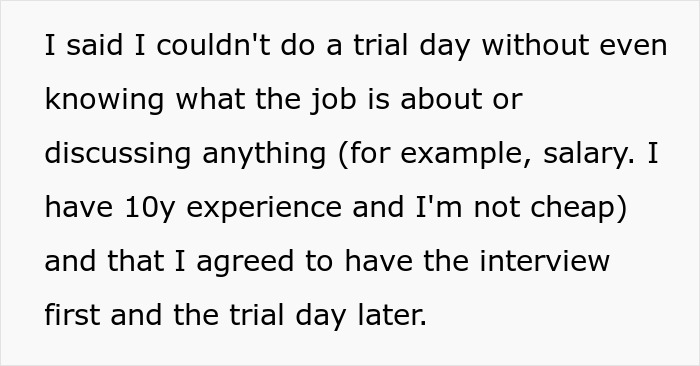
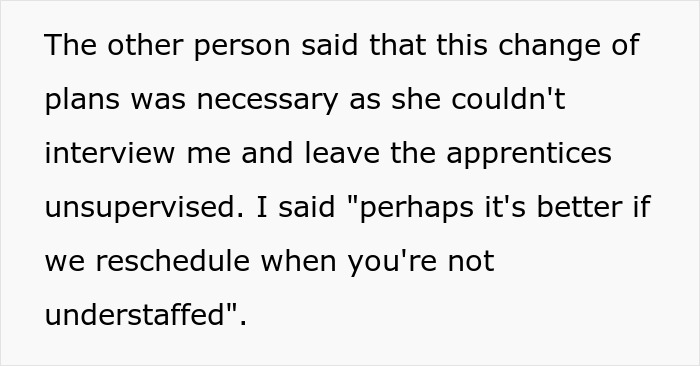

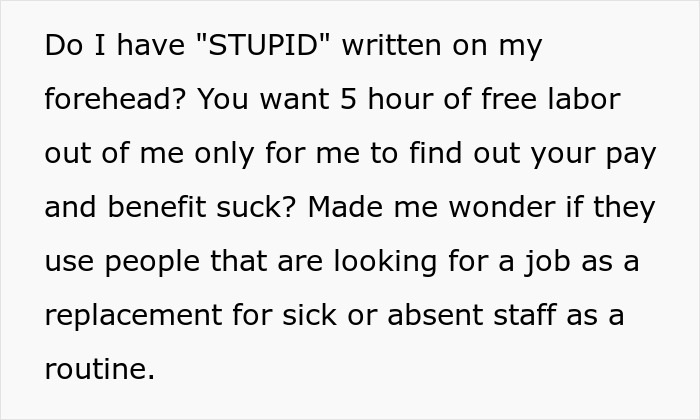


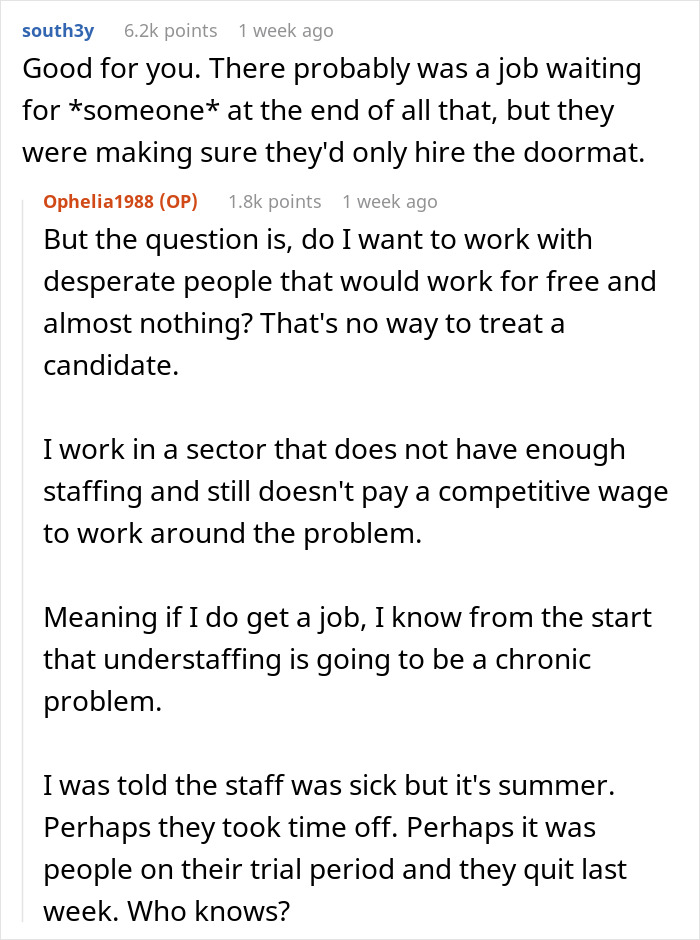
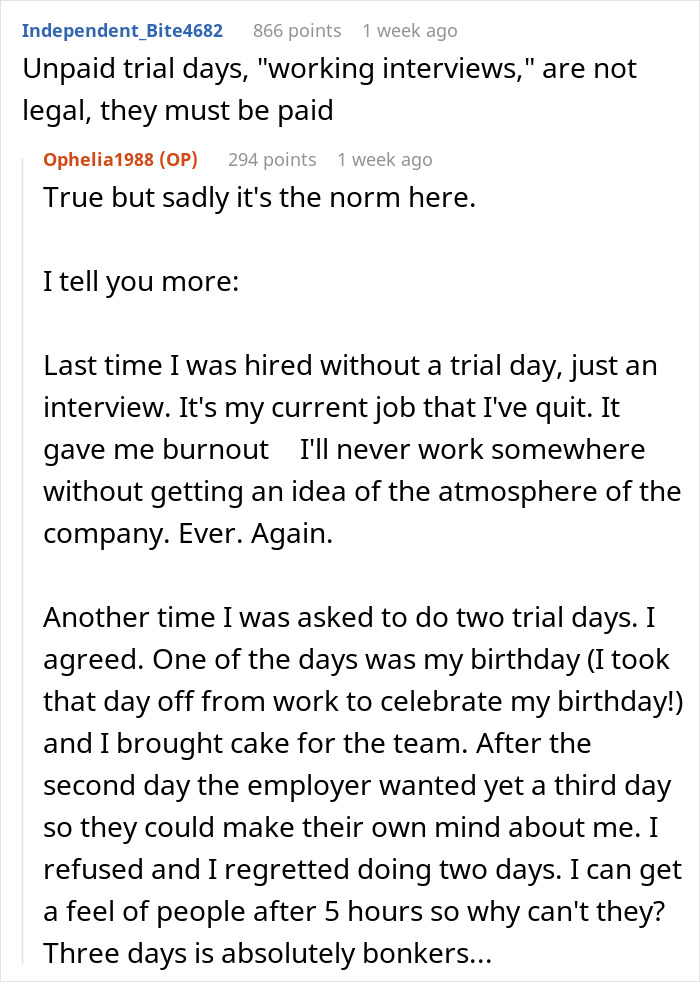
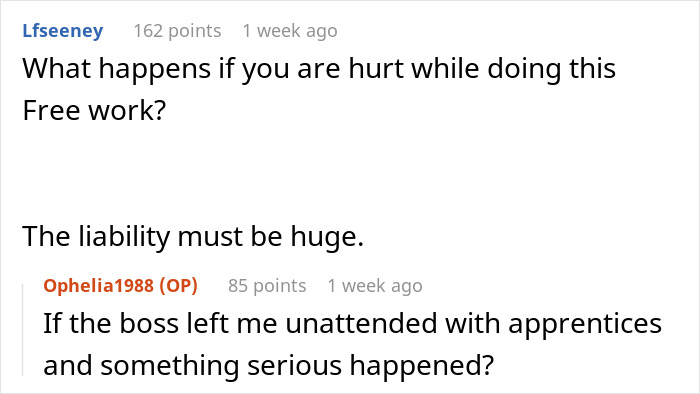
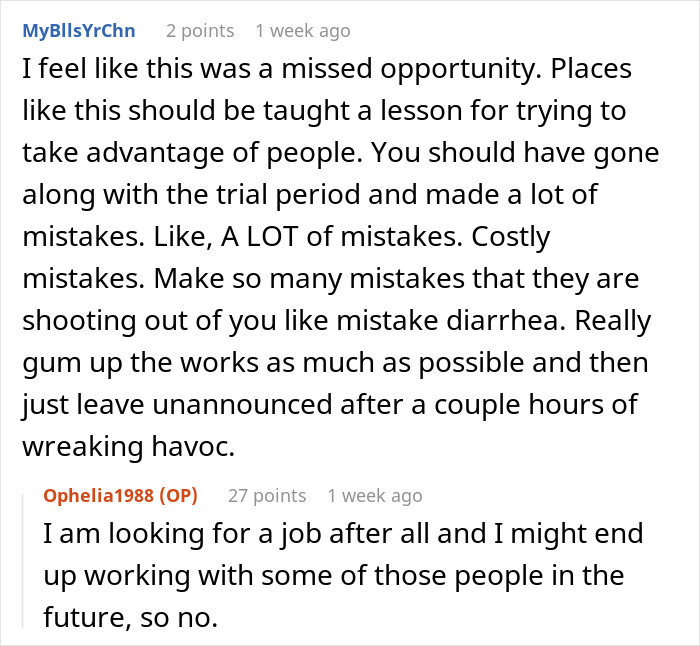
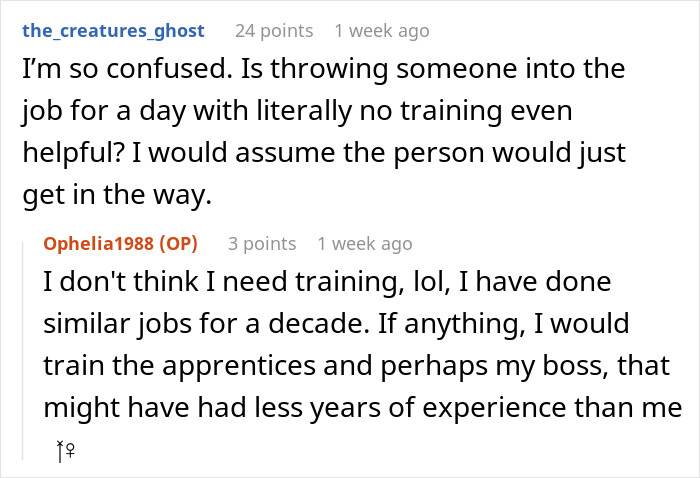
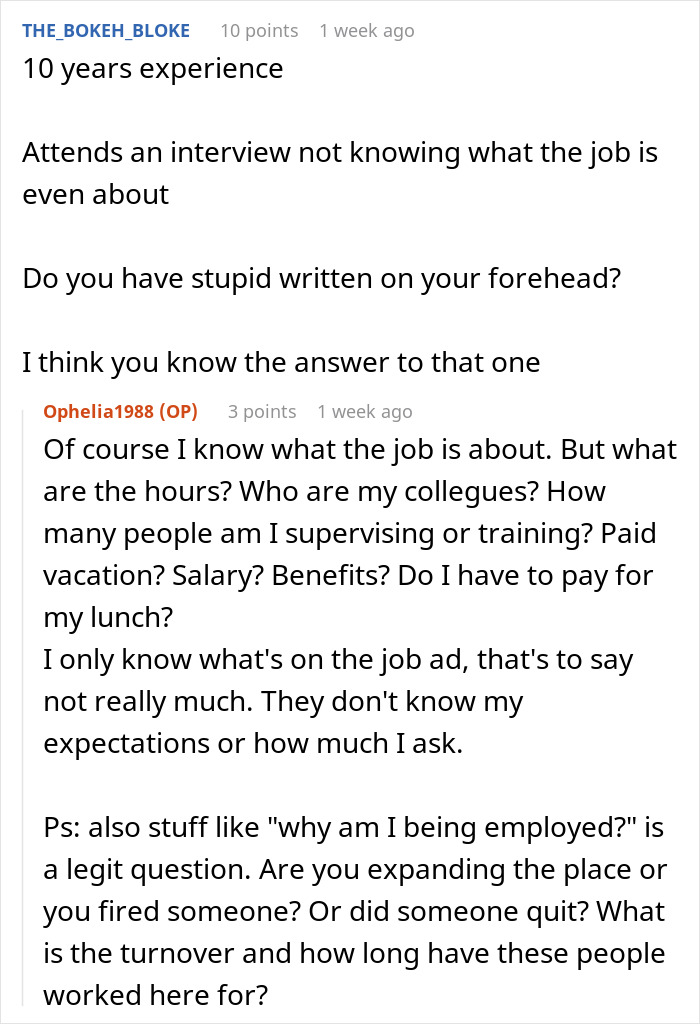
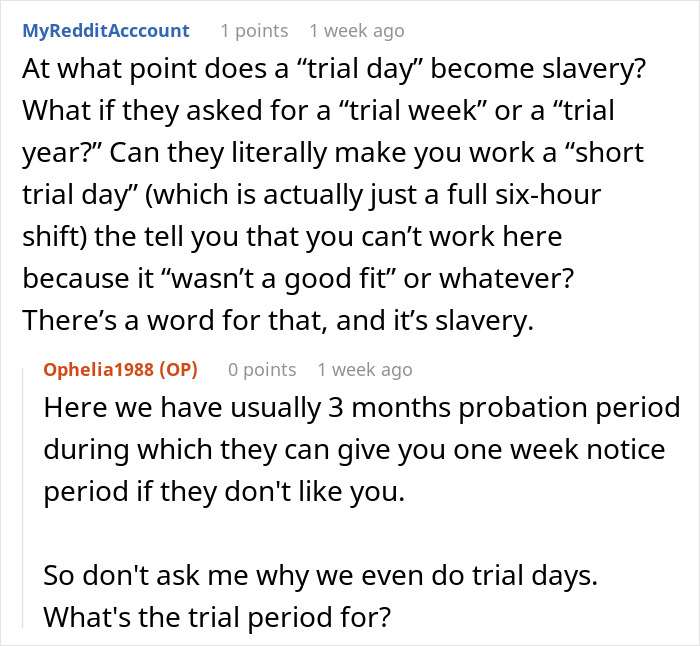

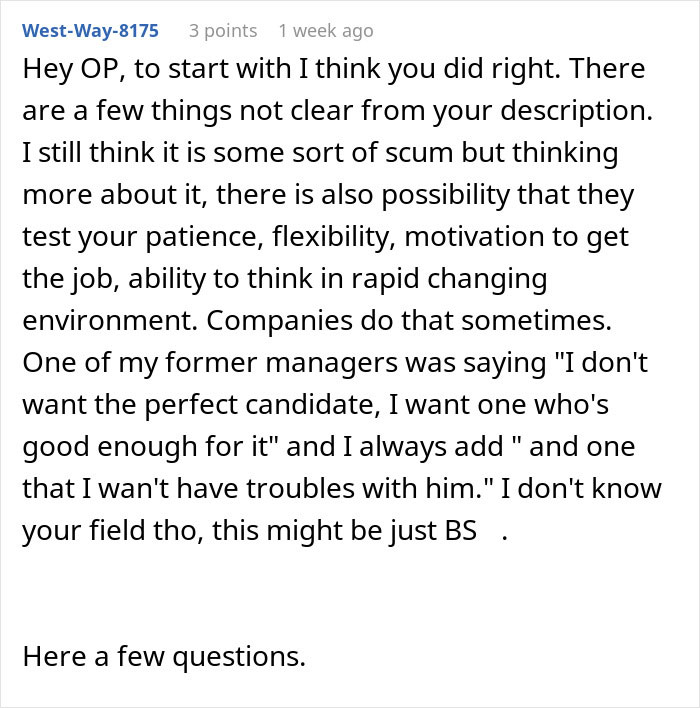
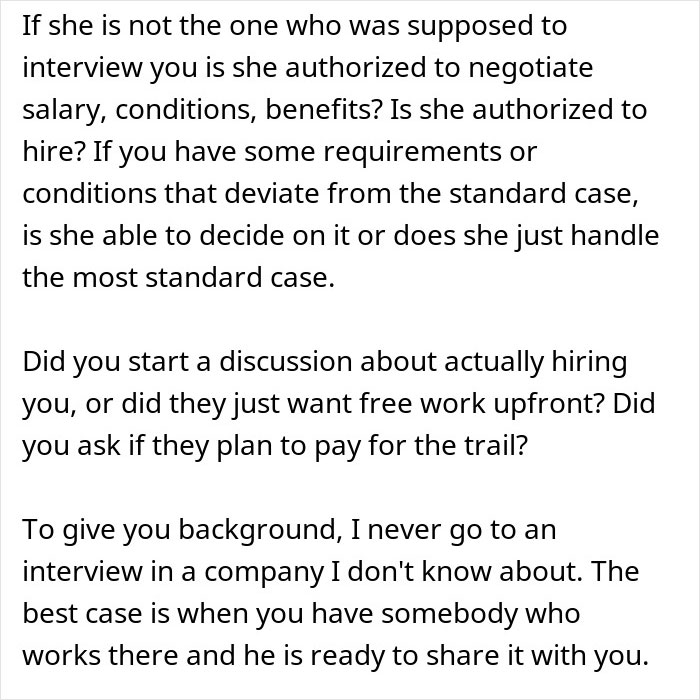
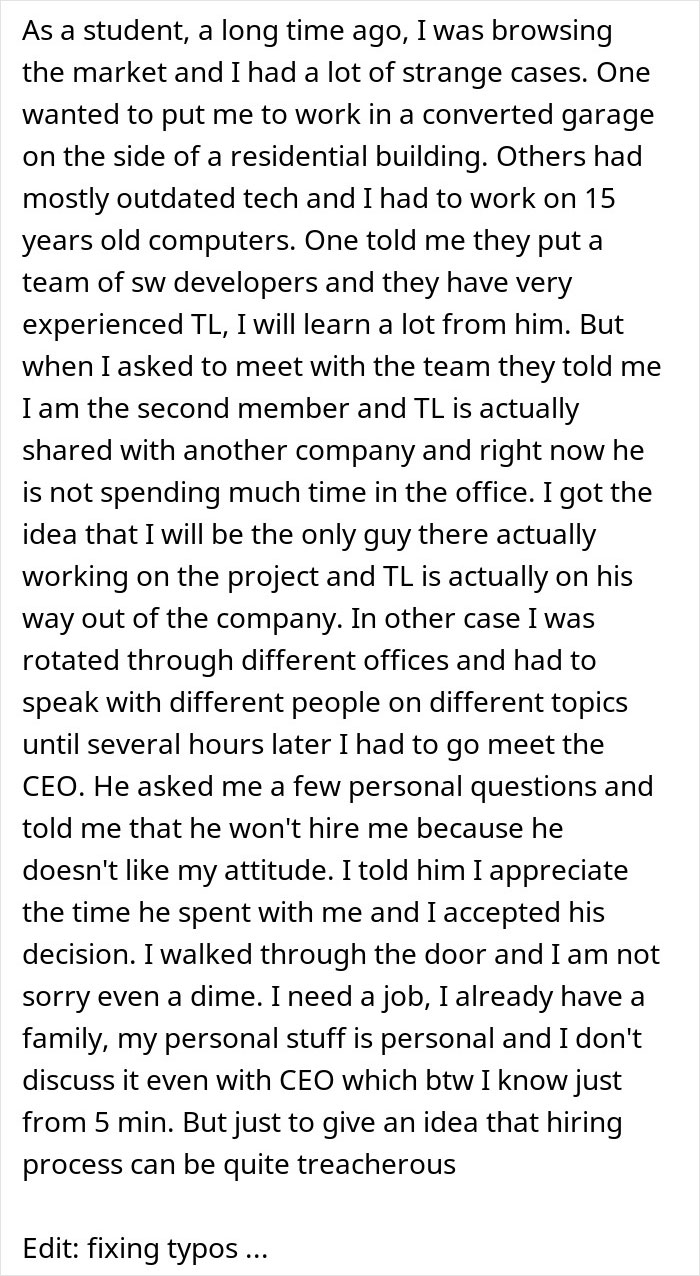
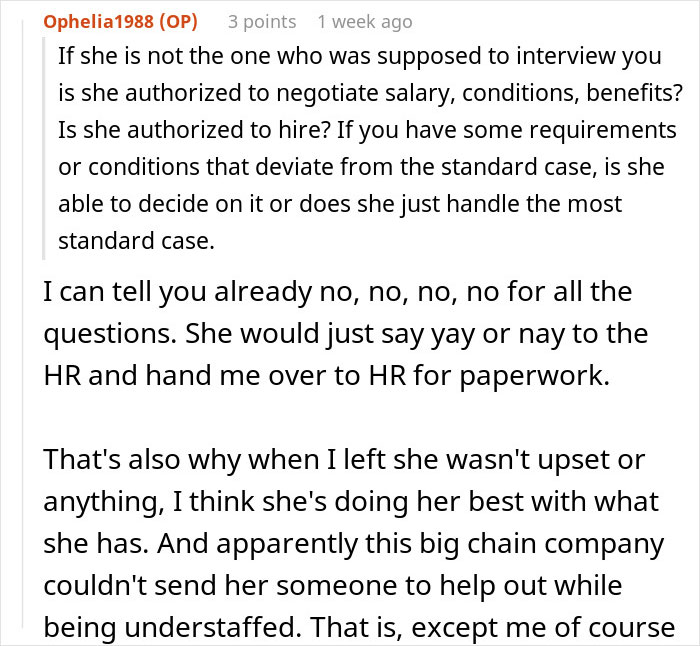

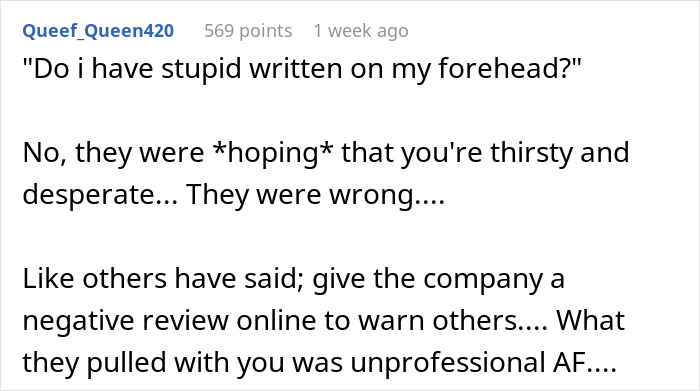


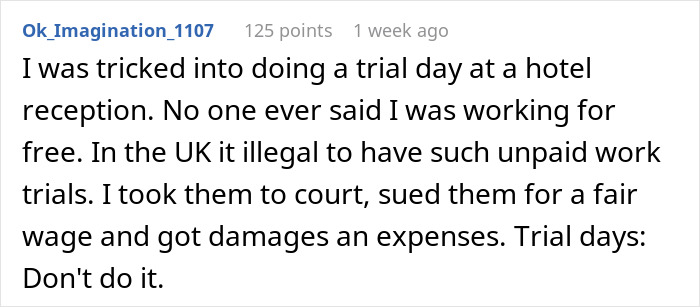
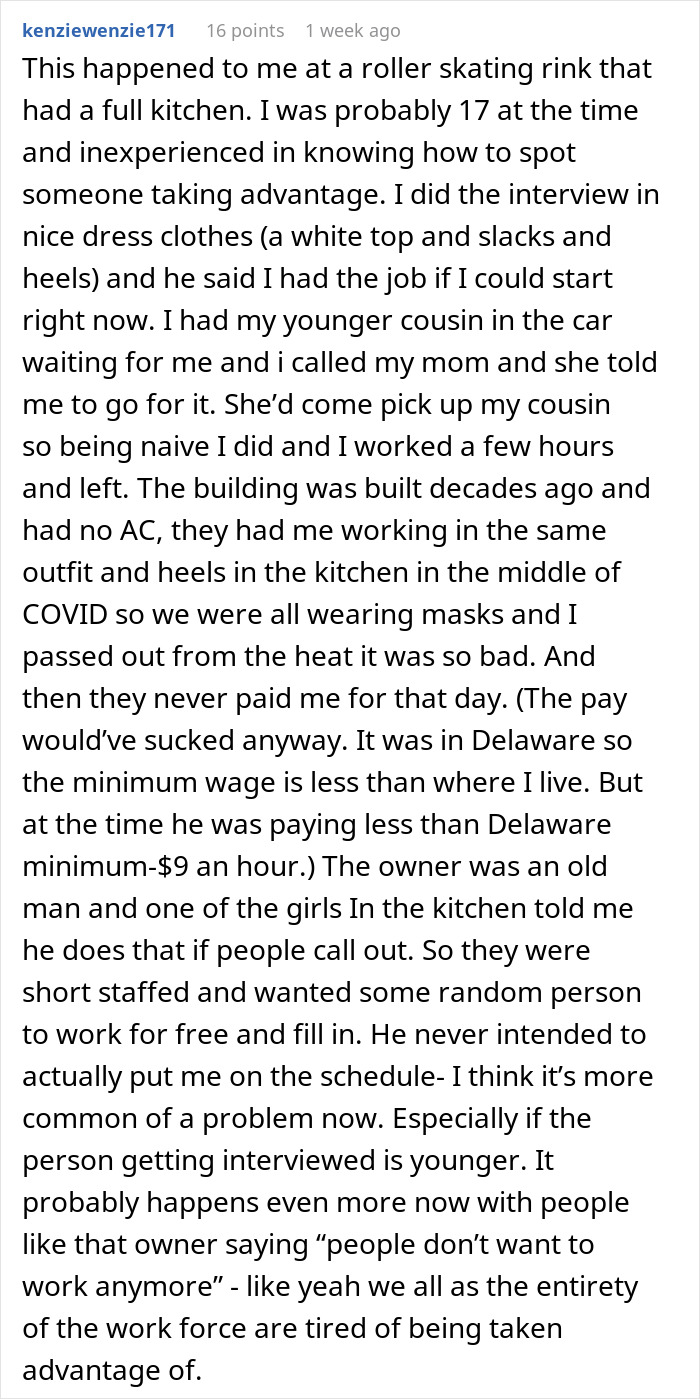
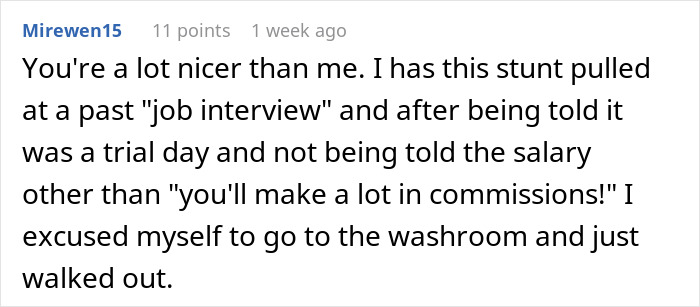
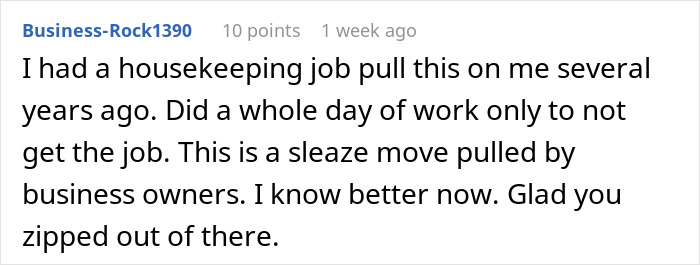
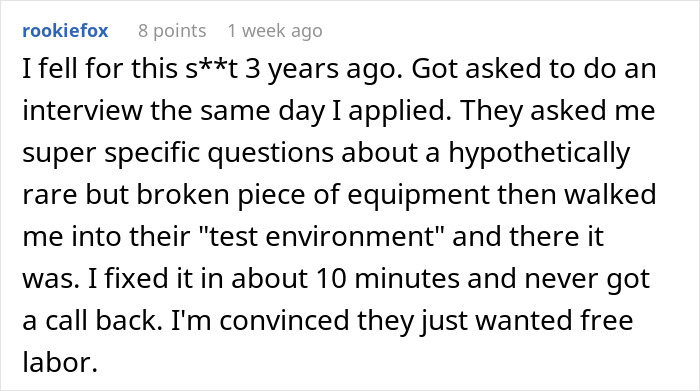
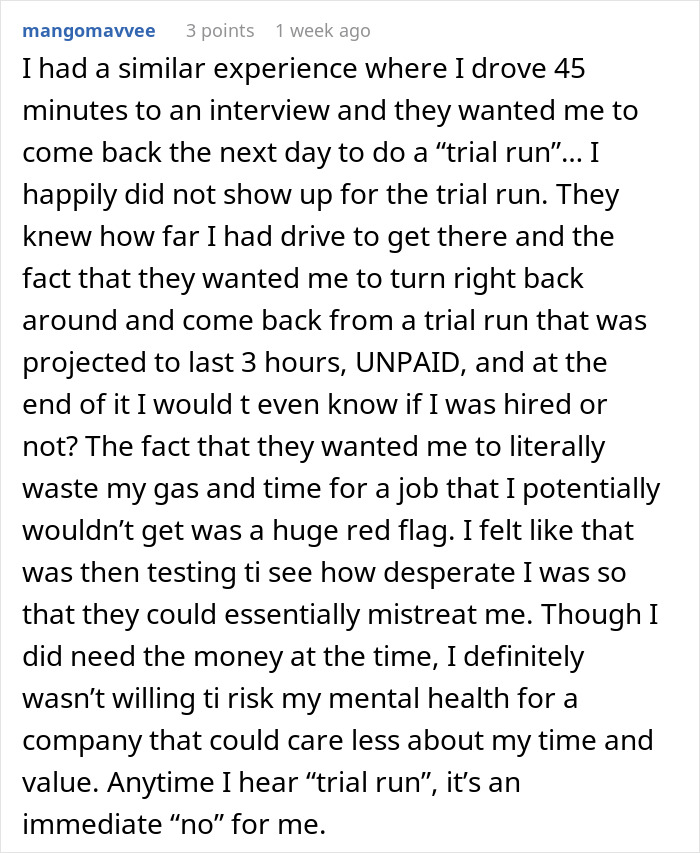











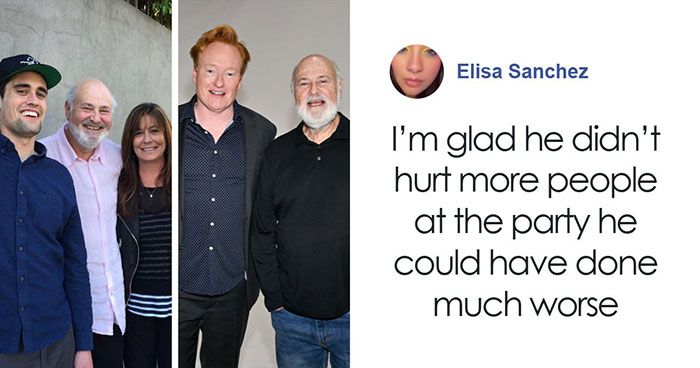
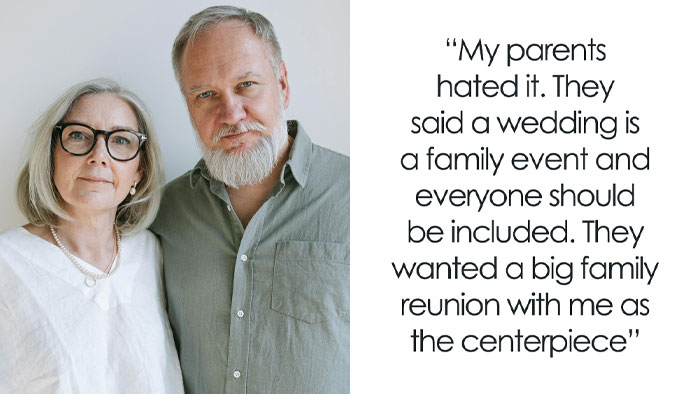































45
4